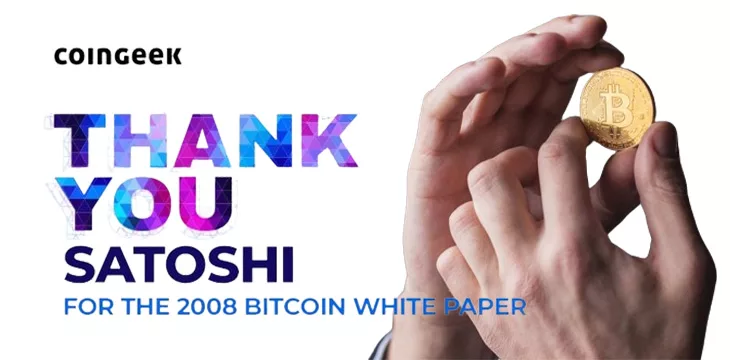|
Getting your Trinity Audio player ready...
|
On October 31, 2008, Satoshi Nakamoto released the Bitcoin white paper on the Cryptography Mailing List and introduced the world to the first scalable peer-to-peer electronic cash system.
I’ve developed a new open-source P2P e-cash system called Bitcoin. It’s completely decentralized, with no central server or trusted parties, because everything is based on crypto proof instead of trust. Give it a try, or take a look at the screenshots and design paper. – Satoshi Nakamoto
It would be several months before the network went live and the first block was mined, but October 31 will forever be the day that the idea for Bitcoin was released into the human consciousness.
Immediate misunderstanding and doubts
Characters like James Donald doubted it could scale even though Satoshi repeatedly explained that it could already compete with Visa upon release and “never really hit a scaling ceiling.” Others misunderstood Bitcoin as a shadowy, untraceable cash system that could be used to bring down the state and commit crimes with impunity, leading misguided individuals like Ross Ulbricht to a jail cell from which he will likely never emerge just a few years later.
Truthfully, even now, 14 years after Satoshi released the Bitcoin white paper, few understand it. Most Bitcoin advocates have totally abandoned the idea of a peer-to-peer electronic cash system (it’s in the title, duh!) and have bought into the digital gold wholesale.
Everyone should read the Bitcoin white paper
Truthfully, all anyone has to do to immediately see through the lies and deceptions that still surround Bitcoin today is actually read and understand Satoshi’s white paper. It’s astounding that such a simple task is beyond people who will pour vast amounts of money into BTC and other altcoins in the hope of hedging against inflation and getting rich.
What can we learn from the Bitcoin white paper? How about the following simple points?
- Bitcoin is a peer-to-peer electronic cash system. It says so in both the title and the introductory abstract. Satoshi talks about how commerce on the internet has become dominated by trusted third parties and how Bitcoin is a solution to this problem.
- Bitcoin was designed to facilitate purely peer-to-peer transactions. It does not require intermediary systems such as the Lightning Network, and payments should travel from Alice to Bob directly rather than through a series of hops and nodes.
- A coin is defined as a chain of digital signatures. Therefore, we can reason that protocol changes that break this chain of signatures, such as SegWit, redefine the very meaning of a Bitcoin as outlined by the inventor of the system in the white paper.
- Nodes collect transactions and put them into blocks, and find proof-of-work solutions for blocks.
- Over time, Satoshi intended for transaction fees to act as the incentive for running nodes. In section six, he said, “Once a predetermined number of coins have entered circulation, the incentive can transition entirely to transaction fees and be completely inflation free.”
Bitcoin was hijacked, but it has been restored, and there’s no stopping it this time
Fourteen years after Satoshi gave the world the first functional, scalable, peer-to-peer electronic cash system, Bitcoin has been through hell and back. However, after all of the misunderstanding, deliberate twisting, and blatant misrepresentation, Satoshi’s Bitcoin, as outlined in his white paper, has been restored and is operating as intended.
Today, Bitcoin trades under the ticker BSV, and the original protocol implementation is known as Bitcoin SV. It processes millions of transactions daily, and a Cambrian explosion of innovation, app development, and use cases are underway. Finally, the small, casual transactions and the purely peer-to-peer network Satoshi designed will flourish, and this time there’s no stopping it.
Happy Bitcoin white paper day! While the past 14 years have been wild, we ain’t seen anything yet. Thanks again, Satoshi!
Watch: BSV Global Blockchain Convention presentation, How Bitcoin works as the base layer for other blockchains

 02-18-2026
02-18-2026 




